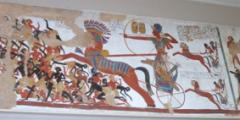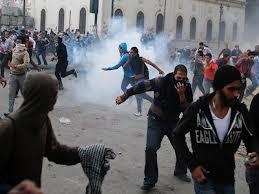WATANI International
24 April 2011
Tomorrow marks three months since the eruption of the 25 January revolution. To mark the event, Watani International looks at revolutions throughout Egypt’s history.
In light of recent events, it is interesting to note that the first revolution in recorded history took place on the banks of the Nile. Such was the scope and force of that revolution that it achieved lasting impacts, not least among which was that ordinary Egyptians acquired the claim to immortality to which only their kings had hitherto laid claim.
The first revolution occurred in the Sixth Dynasty under Pepi II, who reigned for 94 years from 2290 to 2196 BC—generally understood to have been the longest reign of any monarch in history, although some Egyptologists favour a shorter reign of 64 years. The chief cause appears to have been rampant injustice and a vast gap between rich and poor.
Gaining the right to an afterlife
During the Old Kingdom (2664 – 2180BC; from the Third to the Sixth Dynasties), the king ruled the whole of Egypt as his private estate. The country was governed by favoured officials, often sons or near relatives of the king, to whom he delegated royal authority. The court sponsored their upbringing and education, granted them property and saw to the provision of their tombs and funerary endowments after death.
This highly centralised State began to disintegrate towards the end of the Fourth Dynasty, when provinicial governorships and other offices came to be regarded as hereditary appointments. The resources of the State treasury were eroded by gifts of land and exemptions from taxation, often in perpetuity. Provincial governors regarded themselves as little inferior to the king. By the end of the Sixth Dynasty, ordinary people could no longer bear the tyranny of these feudal lords. In addition, they took issue with the king’s claim to sole immortality. They claimed their right to an afterlife.
Following the revolution, the pyramid texts—prayers and incantations granting the king passage into the afterlife—were expanded into coffin texts for use by everyone during the Middle Kingdom. The coffin texts increased further in number in the New Kingdom, when they became known collectively as the Book of the Dead. The victory of the popular worship of Osiris over the official worship of Ra meant that the people eventually won.
Hyksos, Assyrians and Persians
In the 16th century BC the Egyptians arose as one against the Hyksos, a foreign tribal dynasty who ruled during the Second Intermediate Period, between the Middle and New Kingdom, from their capital of Avaris in the Delta. The Upper Egyptian who later became King Ahmos the founder of the New Kingdom, led his people to a final victory over the Hyksos who had ruled Egypt for somew 240 years.
When the Assyrians invaded Egypt, the people rose up under Psammetik, who eventually founded the Twenty-sixth Dynasty—albeit under Persian dominance. The last pharaoh of the Twenty-Sixth Dynasty, Psammetik III, was defeated by Cambyses II of Persia at the battle of Pelusium in the eastern Nile Delta in 525BC. Egypt was then joined to Cyprus and Phoenicia as the sixth satrapy of the Achaemenid Empire. This dynasty, the Twenty-seventh or ‘Persian’, ended in about 404BC. After an interval of independence Artaxerxes III (358 – 338BC) reconquered the Nile valley for a brief period (343 – 332BC). The Egyptian people continued to pay dearly, sacrificing themselves in defence of their way of life until Alexander the Great arrived and drove the Persians out of Egypt, only to occupy it himself.
The Bashmurites
Although in 641AD it was widely held that the Muslims freed Egypt from Roman oppression, the later Ummayid and Abbasid rulers turned religion into an ideology and some of their governors unleashed terrible oppression. Once again, Egyptians rose in revolt.
In 832AD the Egyptians (Copts) of Basmur, east of Alexandria, revolted against the tyrannical rule of the Abbasids. The historian Severus of Ashmunin ascribes the rebellion to the harsh treatment of indigenous Copts by the rulers of Egypt and the seizure of taxes without mercy, which caused incalculable distress. Coupled with the misfortune of recurring bouts of famine, large numbers of Egyptians died from starvation.
The Copts succeeded in driving out the Arab rulers and almost captured the then capital city of Fustat (part of present-day Cairo), but Caliph Ma’mun arrived from Baghdad with a huge army and subdued the Bashmurites. His revenge was terrible: he deported 3,000 captives to Baghdad, most of whom died on the way. Many more were sent as slaves to Damascus.
Fast-forward through Egypt’s history to the 18th century and the next large revolution.
Upsrisings in modern Egypt such as the Orabi revolution are better known than earlier ones, but it is clear that Egyptians are well-versed in making their voices heard over corruption and injustice.
















